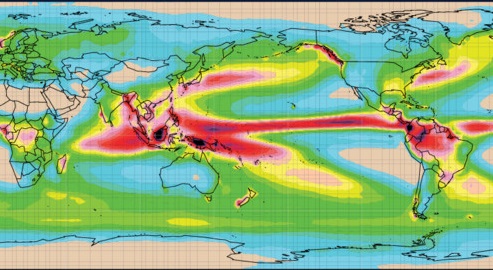
In recent decades, a typical undergraduate university student enrolled in an atmospheric, oceanographic, or climate science major might take about six mathematics and computing courses. This mathematics curriculum has several shortcomings. One is that much of the mathematics that is taught has little relevance to a major such as climate science. Another is that the pace of learning mathematics is too slow to meet the needs of the major courses.
This traditional approach to teaching mathematics treats calculus, linear algebra, statistics, differential equations, and computer programming as isolated and unrelated subjects. Consequently, this methodology not only makes these mathematical topics disconnected from one another, but also makes them even further disconnected from climate science. Therefore, climate science students have difficulty in seeing why mathematics is taught in this way. They are unable to see how mathematics is used in solving “real-world” climate science problems. As a result, climate science professors may complain about the students’ weak mathematics backgrounds. The students in turn are frustrated with the inappropriate and abstract mathematical knowledge that they have acquired from their mathematics professors, who are unfamiliar with the climate science applications of mathematics.
We pose the following question: How should we address the challenges and shortcomings of this disconnected and time-demanding approach to teaching mathematics for climate science students? We have written this book to answer that question. Climate Mathematics presents the mathematical methods from the point of view of climate science applications. Climate Mathematics provides climate science students with a mathematical background sufficient to prepare them to take not only upper-division undergraduate courses, but also most graduate-level climate science courses. Furthermore, Climate Mathematics enables students to analyze and visualize typical climate datasets, empowering them to carry out research and providing them with valuable skills. Climate Mathematics is a modern toolkit of useful mathematics, statistics and computing for climate science in the era of big data.
Climate Mathematics can be taught in from 1 to 3 semesters, depending on the students and their backgrounds. It provides the mathematics, statistics, and programming needed to prepare for coursework and research in climate science, meteorology, and oceanography. Assuming no background beyond high school mathematics, Climate Mathematics presents selected concepts and techniques in linear algebra, statistics, calculus and differential equations. All are discussed with climate science examples. Climate Mathematics relies on recent key advances in scientific computing. Computational techniques are provided to visualize, analyze, and apply climate data. R code is featured in the book. R and equivalent Python codes are both available online. Exercises are provided in each chapter of Climate Mathematics. Online supplements to aid classroom teaching include datasets, images, and animations. We provide guidance on how the book can support courses at different levels. This guidance makes the book a highly flexible text for both undergraduate and graduate students. Climate Mathematics can also serve as a reference for researchers and other professional climate scientists who need to refresh or modernize their quantitative skills.
Order your inspection copy of Climate Mathematics at: [email protected], or to find out more please go to the book’s dedicated webpage.
Latest Comments
Have your say!